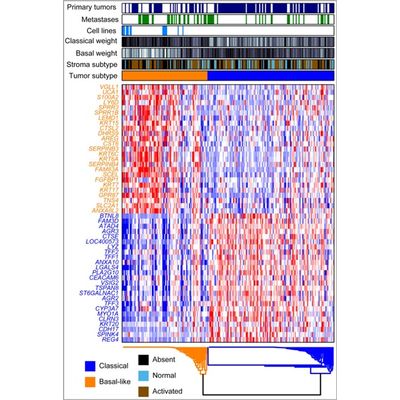

- Home
- Companies
- GeneCentric Therapeutics, Inc.
- Products
- GeneCentric - Pancreatic Cancer Subtype ...

GeneCentric - Pancreatic Cancer Subtype Profiler (PurIST)
Pancreatic Cancer is the 11th most common cancer type with an estimated 55,000 new cases in the US in 2018, according to the United States National Cancer Institute. While it represents three percent of all cancers, pancreatic cancer is one of the most lethal as it is so difficult to detect in early stages, accounting for seven percent of all cancer deaths and carrying among the lowest five year-survival rates – 8.5%. It is the third leading cause of death attributable to cancer in the U.S.
Pancreatic cancer occurs slightly more frequently in men than women, generally at an older age, and is more common among smokers than non-smokers. The most common type of pancreatic cancer occurs within the exocrine cells that comprise the exocrine glands and ducts. The exocrine glands make pancreatic enzymes that are released into the intestines to aid in food digestion (especially fats). Cancer within the exocrine tissues comprise the vast majority of all pancreatic cancers and are usually adenocarcinomas that emerge in the ducts of the pancreas (known as Pancreatic Ductal Adenocarcinoma, or PDAC). Less common types of exocrine-related pancreatic cancer include adenosquamous carcinomas, squamous cell carcinomas; pancreatic neuroendocrine tumors also occur, at a relatively low (<5%) frequency. Based on extensive studies involving gene expression levels across hundreds of genes in PDAC cells, researchers at the Yeh Lab of the University of North Carolina at Chapel Hill’s Lineberger Cancer Center identified unique gene signatures classifying both tumor and stroma subtypes associated with PDAC. Dubbed PurIST, for Purity Independent Subtyping of Tumors, the profiler consists of two primary PDAC tumor subtypes – basal or classical; meanwhile the stroma subtypes are classified as activated or normal. GeneCentric is working with the Yeh Lab to reveal how these subtypes differ from one another with regard to key target genes, immune cell infiltration or expression, overall survival and response to anti-cancer therapies. These subtypes have been developed with the objective of providing information regarding likely differential response to treatments for PDAC and our goal is to advance them rapidly for use in drug development as well as in the clinic for the benefit of patients.
